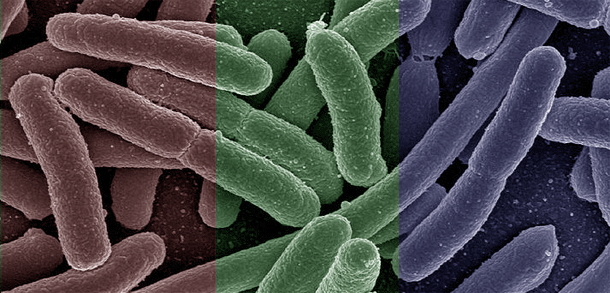By Lauryn Lax, OTD, NTP, CPT
You know your astrological sign, Enneagram type, and maybe even your dosha—but what about your gut type?
In my experience with nutritional therapy and health coaching, everyone has what I consider a distinct “gut type”—or your gut’s default state of imbalance, which shows its true colors when you’re stressed or internally out of whack.
That’s because our microbiomes and mind are connected via the gut-brain axis. So when you are stressed out (mentally or physically), this sends signals to not only spike your cortisol (the stress hormone) but also sends inflammatory stress signals from your brain to your gut—kicking your default “gut type” into high gear.
The way I see it, your gut type is a reflection of whether or not your gut is working in tiptop shape. For example, if you have a “digestive gut,” when your body is out of balance from lack of sleep or anxiety, your default mode is to turn toward digestive-related symptoms, such as bloating or constipation.
You certainly can experience symptoms from all gut types; however, your primary type is what I use to identify the body’s default tendency amid imbalance. Knowing your gut type can help you better customize food, supplements, and lifestyle factors that help you feel your best.
Here’s how I qualify the five basic gut types, based on my experience:
1. Digestive Gut
Potential signs:
- Bloating
- Constipation
- IBS
- SIBO
- Candida
- Gastritis
- GERD
- Nausea
The Digestive Gut represents the gut type with the most overt digestive problems and gut-related symptoms like constipation, bloating, loose or hard stools, nausea, IBS, SIBO (small intestinal bacterial overgrowth), and gastritis.
Basically: The Digestive Gut people feel health imbalances directly in the gut!
From what I’ve seen, the most common catalysts stem from a dysfunction in the typical process of digestion—impaired “digestive mechanics.” These include improper food chewing, low stomach acid, low digestive-enzyme production, gallbladder issues, and intestinal permeability (leaky gut).
The American Gut Project—the largest study and sampling of the human microbiome to date—found that the more diverse the gut bacteria (and the richer in Bifidobacteria) in the biome, the healthier people were as a whole. Folks with a Digestive Gut are often lacking these variables.
People with this gut type often don’t practice daily dietary and lifestyle factors that support gut health. Instead, here are a few common habits of Digestive Gut types to note:
- Eating the same foods every day
- Eating fast or on the go
- Lack of outdoor/fresh air
- Overtraining or sedentary lifestyle
- Sleep deprivation
- Eating foods you are intolerant to (not just gluten and dairy but artificial sweeteners, fillers, and chemicals in bars and shakes, etc.)
- Long-term dietary restrictions (meat-free, fat-free, or carb-free diets)
- Lack of work-life balance
- Few social connections
Many people with a digestive gut type have no idea their gut health is actually “off”—they think pooping every other day is normal (it’s not), or that feeling bloated after meals is to be expected (that’s what antacids are for). Well, I’m here to tell you, it’s not.
A peek at your poop can give you clues into whether or not you have a digestive gut type. Stool consistency, color, and transit time reflect the health of gut microbiota and internal activity. Healthy poop is medium brown, well formed in an S- or C-shape, passes one to three times per day, and leaves you with a feeling of complete elimination. If it’s anything different, your body may be telling you something is up.
For example, watery stools are they body’s way of sending a signal that it’s not happy with what you ate. Hard-to-pass, rock-like poop also means it’s time to make some changes—you’re not drinking enough water or are possibly lacking cooked, colorful veggies or healthy fats in your diet. Leftovers? Food did not pass through the entire digestion process for some reason—perhaps microbial imbalances or poor digestive mechanics (like stomach acid, enzymes, and proper chewing).
2. Immune Gut
Potential signs:
- Skin breakouts
- Autoimmunity
- Allergies
- Asthma
- Sinus congestion
- Frequent colds
As much as 70% of the immune system is housed in the gut, and some people may be more predisposed to experiencing immune-related symptoms when their gut is “off.” This is what I classify as “Immune Gut.”
The Immune Gut type is characterized by imbalances like skin breakouts, autoimmune conditions, allergies, asthma, multiple food intolerances, environmental sensitivities and reactions, and frequent illness (the person who gets sinus infections, colds, or strep throat routinely).
Although anyone can have the genetic predisposition for an Immune Gut type, I believe it’s most often cultivated in the first two to three years of our lives.
For example, some limited research suggests that children who receive antibiotics in the first year of life have higher rates of asthma, allergies, and food intolerances. That’s because antibiotics eradicate gut bacteria, even the healthy ones. People with allergies and asthma often have imbalances in gut bacteria—conversely, lack of bacterial diversity in the gut may increase allergy susceptibility, particularly seasonal and nut allergies.
What’s more, people in this category may have intestinal permeability—also known as leaky gut—or underlying gut imbalances like SIBO, candida, or dysbiosis.
3. Toxic Gut
Potential signs:
- Mast-cell activation syndrome
- Chemical sensitivity
- Multiple food sensitivities
- Mold illness
- Lyme disease
- Vertigo
- “Nothing helps”
- Viral and bacterial infections
I consider a “Toxic Gut type” the person who can’t seem to figure out why they aren’t getting better, despite doing everything to be healthy—taking probiotics, drinking green juice, working out, meditating, etc. Many doctors may not even be able to figure out what’s wrong.
The person with a Toxic Gut typically has a history of autoimmunity or some immune-trigger like a gut infection, mold exposure, or Lyme disease. They have often exhausted supplements, lab testing, medication options, and multiple therapies—from acupuncture to chiropractic, all in efforts to feel better, with little to no resolution.
The problem is, from what I’ve observed, the Toxic Gut has difficulty moderating pathogens and oxidative stress—this can lead to high circulating levels of inflammation while also making them highly sensitive to foods, chemicals, and/or smells.
Once more, if you are “doing all the things” and nothing seems to help, a Toxic Gut type may be at play.
4. Hormonal & Metabolic Gut
Potential signs:
- Unwanted weight gain
- Blood sugar imbalances
- Low testosterone
- PMS
- PCOS
- Insomnia
- Period irregularities
- Hypothyroidism
The gut microbiome is a vital organ in the endocrine system that acts like the conductor to your hormonal symphony. If your gut health is out of tune, then your hormones follow.
Those who have what I call a “Hormone and Metabolic Gut type” may also have digestive dysfunction, like SIBO, candida, or leaky gut, but their primary symptoms are related to their hormones—endometriosis, PCOS, PMS, irregular cycles, insomnia, or a thyroid condition. Since gut health is also tied to metabolic health, people with this gut type may have all sorts of metabolic imbalances, like unwanted weight gain, fatigue, and blood sugar issues.
As for hormones, the relationship between hormones and the gut microbiome is bidirectional. When gut bacteria are balanced or imbalanced so are your hormones, and vice versa. There are a few types of hormones, in particular, that I feel deserve a mention: sex hormones (estrogen and testosterone), sleep (melatonin), thyroid hormones, and stress (cortisol).
5. Brain Gut
Potential signs:
- Anxiety
- Depression
- Eating disorders
- ADHD
- Headaches and migraines
- Autism
- Alzheimer’s
- Brain fog
Speaking of cortisol and stress, the last primary gut type I’ve identified, the “Brain Gut type,” is exactly what it sounds like—disruption in the brain-gut connection. The Brain Gut type experiences mindset imbalances and challenges as their primary default symptom.
Your gut is often called your “second brain” because it is directly linked to your brain, connecting your enteric and central nervous system.
The brain-gut connection is a two-way street. The more stress you feel, the more likely your gut health suffers. A key marker of an altered brain-gut axis is also slowed motility—constipation and bloating, gastroparesis—and a tendency to get IBS, nausea, or loose stools when overly stressed or anxious. This is because the vagus nerve—the brain nerve that connects the brain to the gut—controls gut motility and bowel movements.
Likewise, the more stressed or unhealthy your gut, the more likely you are to experience mental health symptoms like anxiety, depression, eating disorders, headaches or migraines, ADD/ADHD, or mental sluggishness. For instance, one cross-sectional study of 4,763 participants found those with IBS were four times more likely to have anxiety than those without IBS.
Interestingly, when you support the gut, you can change the brain—regardless of your mindset or mental health challenge. A review of 21 studies, for example, suggests modulating the gut through probiotic supplementation and lifestyle interventions may offer countless benefits for individuals with anxiety and IBS.
Wildcard Gut
Potential signs:
- Inflammation
- A combination of all gut types
Last, but not least, if none of the primary gut types sound like you or you feel like you are a combination of all five, I’d classify your gut as a “Wildcard Gut,” primarily characterized by inflammation when you are out of balance.
The symptoms of the Wildcard Gut are vast, including (but not limited to): high blood pressure, high cholesterol, joint pain or chronic pain, arthritis, feeling swollen, occasional bloating, constipation, yeast infections, skin flares, headaches, seasonal allergies, heartburn and indigestion, and irregular bowel habits.
Sometimes inflammation is even “silent,” without symptoms. A person may just feel tired or generally unwell.
Basically, with a Wildcard Gut type, your gut may be inflamed, but you can’t always put your finger on what’s going on.
The takeaway.
So, there you go: Those are the five gut types (plus, the Wildcard).
Again, it’s important to note that your primary gut type or “bad gut health” itself does not show its true colours unless something inside is off. In other words: You don’t come into this world with a hormonal gut until something happens to make your symptoms flare.
The main idea to keep in mind is that your gut is the gateway to health.





